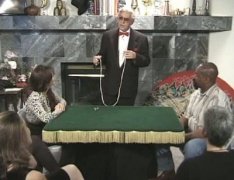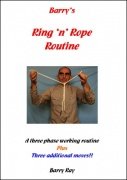Ropes, Ribbons, Strings & Reels in Magic & Conjuring: page 1
Authors
Products
| Sort by: Product Name Author | Listed | Price |
The Invisible Thread Manual or The String BookRalf Wichmann-Braco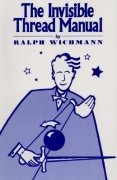 Here are the real secrets of thread work. This ebook was originally published by the Berlin Magic Circle in a bilingual (German/English) edition, and in England it was sold and recommended by Ken Brooke. If you are prepared to spend the time learning some of the material in these pages you will have miracles at your fingertips. Braco and Finn Jon are the worldwide experts on invisible threads and floating routines. This ebook also contains a special bonus: the full routine for Mike Danata's Floating Golden Stick. This is the best work on the subject still. 1st edition 1973 in bilingual (German/English).... | ★★★★★ $10 to wish list | |
Drunken Cork & Heart in LovePeki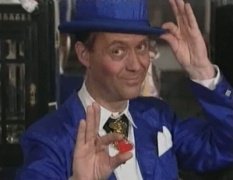 You get two floating object performances by Peki. One is the fun "Drunken Bottle Cork" and the other a poetic "Heart in Love" routine. Please remember that you will only get the performances and no explanations. But if you know Peki's thread and method these two routines serve as further examples of what is possible with such a wonderful close-up floatation method. Please refer to Dance of the Butterfly, The Dancing Handkerchief or The Fairytale of the Silver Pearl for details on the thread and the method used by Peki. runtime: 2min 31s | $7 to wish listMP4 (video) | |
Dance Of The ButterflyPeki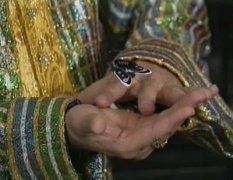 A paper butterfly flutters above your hands, flies around and even lands on a rose. You will learn the secrets of Peki's invisible thread that makes it much more invisible than other threads even in close up instances where viewers are only a few inches away from the action. Professionally dubbed into English from German. runtime: 10min 19s | $10 to wish listMP4 (video) | |
The Dancing HandkerchiefPeki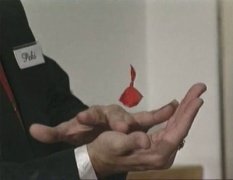 A close-up version of the famed Dancing Handkerchief routine used by many stage magicians. A miniature handkerchief jumps out of a small container, dances, bounces around and walks across a magic wand before going back into it's jewel box. The entire routine happens in your hands while standing. You will learn the secrets of Peki's invisible thread that makes it much more invisible than other threads even in close up instances where viewers are only a few inches away from the action. Professionally dubbed into English from German. runtime: 13min 33s | ★★★★★ $10 to wish listMP4 (video) | |
The Fairytale Of The Silver PearlPeki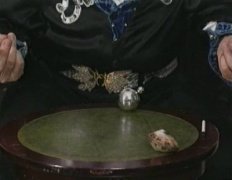 A particularly beautiful routine features a small silver ball or pearl that is removed from a seashell and takes a life of its own. It floats in the air, between your fingers, rides up a small magic wand, travels along the circumference of a large ball bearing and rolls along the back of your hand as it finally floats to you so it can be put back into the shell. You will learn the secrets of Peki's invisible thread that makes it much more invisible than other threads even in close up instances where viewers are only a few inches away from the action. Professionally dubbed into English... | ★★★★★ $10 to wish listMP4 (video) | |
Professor's MathAldo Colombini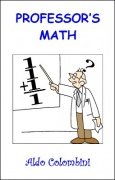 Here’s a unique handling for the “Professor’s Nightmare” rope routine that you’ll use in your act. WHAT THE AUDIENCE SEES: The magician cuts a length of rope into three pieces of different lengths; small, medium and long. The three pieces are stretched until they appear to be all the same length. The three pieces of rope are then tied together. The knots vanish and apparently the rope is fully restored. Until now the effect is a standard one. But wait…here comes the incredible finale! One knot is magically thrown back onto the rope then jumps away leaving the rope completely... | ★★★★★ $10 to wish list | |
Rupert Howard Magic Course: Lesson 04: String and Rope TricksRupert Howard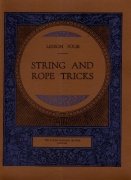 Table of Contents
1st edition 1931; 26 pages. | ★★★★★ $4 to wish listPDF_facsimile | |
Tight RopeAldo Colombini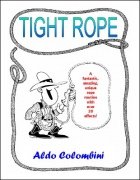 A unique rope routine with over 20 effects. Here Aldo created a wonderful rope routine in eleven phases where rope is stretched, cut, restored, knotted and so forth:
1st edition 2010; 15 pages. | ★★★★★ $10 to wish list | |
The Pull BookPatrick Page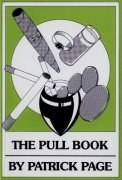 Pulls, reels, and threads are some of the most usefull gimmicks to a magician. Just think about the popular ITR (Invisible Thread Reel). But you might say: "I only do cards, I don't need to know these stage methods." Think again. For example, Patrick Page illustrates in what he terms the 'pendulum principle', a method how you can with a simple piece of thread clean up a lapped card such that you can get up from the table clean. So even for the pure pasteboard afficinado, there is something to be found that will take your effect to another level. And I love when Page starts with 'a little bit... | ★★★★★ $12 to wish list | |
Cut & Restored RopeMichael Skinner | ★★★★★ $6 to wish listMP4 (video) | |
Ring, Rope and WandDaryl Easton This is a wonderfully visual and very simple routine. No gimmicks required. One simple move does the trick. All you need is a wand, stick or pencil, a piece of rope and a borrowed finger ring. You ask two spectators to assist you. Rope, ring and wand are examined. Then the ring is fairly and openly put on the center of the rope. The magician covers the ring with his hand, each spectator holds with one hand an end of the rope and with the other hand an end of the wand. The ring magically jumps from the rope onto the wand. Voila! Simple to perform and suitable for the beginner. runtime:... | ★★★★★ $6 to wish listMP4 (video) | |
Bands of Gold(Benny) Ben Harris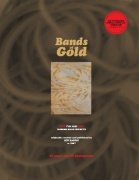
The opening trick in this gorgeous ebook is just cool. A mini bet in which 2 bands are shown around the card case width ways. One will win the spectator $100 and the other one will win the magician $100. One is selected by the spectator without equivoque. Of course it's just a normal band. The other is removed and... | ★★★★★ $9.95 to wish list | |
Barry's Ring 'n' Rope RoutineBarry Ray | ★★★★★ $20 to wish list | |
Three Bets on the BandR. Paul Wilson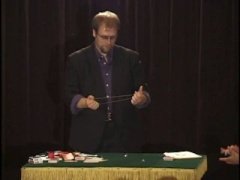 Three professional effects with a finger ring and a rubber band. Paul takes three well known rubber band effects, one is the popular "Crazy Man's Handcuffs", and shares his touches and improvements. Paul is not teaching each of these routines but rather focuses on his contributions. Recorded live at the Convention at the Capital 2001. runtime: 6min 32s | ★★★★★ $6 to wish listMP4 (video) | |
Elastic Thread Routines(Benny) Ben Harris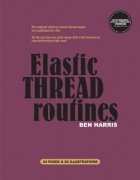 The original work on elastic thread magic, first published in 1989. All the pro tips you need, along with six full routines to start performing right now. You see so much information published about "Elastic Thread Magic" today—you'd think it all "brand new". Alas, such is not the case. If you look hard, you'll see much of today's gold is really the silver of yesteryear. This manuscript contains original routines as well as important information that appeared in the original 1989 manuscript. Even the illustrations are the originals. Enjoy and impress... Subjects covered:
| ★★★★★ $8.95 to wish list | |
Knowing The Ropes (Know-How Series)Will Ayling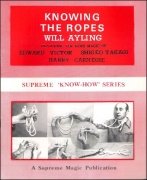 Featuring the rope magic of Edward Victor, Shigeo Takagi, and Harry Carnegie. This was part of the Supreme 'Know How' series written and edited by Will Ayling, which was the continuation of the famous Teach-In series by Lewis Ganson. 1st edition 1987; original 36 pages; PDF 44 pages.
| ★★★★★ $9.50 to wish list | |
The Endless Chain (Know-How Series)Rex Taylor & Will Ayling & Lewis Ganson & Fred Lowe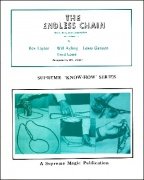 This is not a magic trick but a carnival game, a con game, where the operator can decide if you should win or not. Everything looks fair and above board, but there is simply no chance for the mark to win. It looks so innocent, a ball-chain loop, put out on the table in a figure eight. One loop in the eight catches your finger the other does not. You have to find the one that catches your finger. Only problem is that you will never find it if the operator so decides. This game is sometimes called Loopy Loop, Figure Eight, the Chain Swindle, or Pricking the Garter. You will find in this ebook... | ★★★★★ $9.50 to wish list | |
Full Circle Rope RoutineL. C. Collier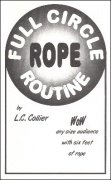 The magician pulls out a six foot piece of rope, pulls it up in the center and clearly cuts the rope into two pieces. He then picks up the bottom ends, brings them to the top and the rope fully restores. He then grabs the rope by the middle and cuts it in half again. He trims off the pieces at the top and the rope restores a second time. He folds the rope into thirds and cuts it at the top and bottom. He clearly counts off the three separate and equal pieces from one hand to the other. With all the pieces held in one hand he brings the bottom ends to the top and individually pulls out three... | ★★★★★ $5 more than onetype to choose from softcover | |
Big Ring on StringL. C. Collier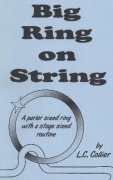 A parlor sized ring with a stage sized routine. This is a compact ring and string routine which uses some of the most visual moves one can do with these props. For many years I have performed a very similar routine. I used a red cotton ribbon instead of the standard white rope, because a ribbon lies flat on the ring and is wider than a rope allowing for some sequences a stronger illusion. 1st edition 2003; 10 pages. | ★★★★★ $5 more than onetype to choose from softcover | |
The Hindu Thread Trick or Gypsy Thread Teach-InLewis Ganson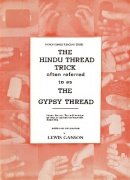 The Gypsy Thread trick is one of those classic effects in the same league as a linking ring or cups and balls. A thread is broken into several short pieces and then magically restored into one long piece of thread. Many of the best magicians have made the gypsy thread a feature of their performances: Fred Kaps, Dany Ray, Ricky Jay, Billy McComb, Ali Bongo, Hans Trixer, Marconick and Eugene Burger to name just a few. Lewis Ganson teaches in detail with text, photos and illustrations the ins and outs of this routine. This was part of the famous Ganson Teach-In series originally published by Supreme Magic Inc. Rights are now owned... | ★★★★★ $9.50 to wish list | |
Hunter Knot RevisitedTimothy Hyde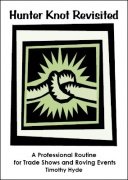 The Hunter Puzzle Knot is a deceptive effect that a lot of magicians know, but is sometimes overlooked as a strong performance piece. Timothy built a routine around this simple but effective idea, that has proven to be a very commercial routine. For many years Timothy featured this very routine as his opening effect for Trade Show performances. It quickly stops one person and then another, the crowd then snowballing into a laughing involved crowd of 30-40 or more! Your clients will love the way this works as a traffic generator. It’s also just as effective for large walk around or roving... | ★★★★★ $14.95 to wish list | |
The King Has Left the Building ... with AmnesiaJeff Pierce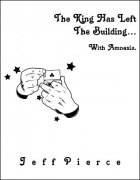 Thinking Inside the Box
Cash Deposit
Empowerment
Visual Rubber Band Un-Link
Rubber Band Split
The Shrinking Band
The King Has Left The Building... With Amnesia Remote... | $9.99 to wish list | |
Sealed Mysteries of Pocket MagicJean Hugard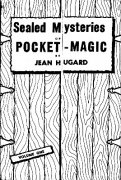 Jean Hugard describes in this booklet a complete routine consisting of 6 effects. He starts with a card trick, the piano card trick, and continues with a series of rope effects: production of a rope six feet long; doubling the rope; trick with two ropes; triple cut and restored rope; comedy explanation of vanishing knots. The value of this booklet is in the routining itself. Hugard has used this routine many times with great success. The effects follow in a logical succession each building on the other. Paul Fleming wrote: It is one thing to "work up" a number of tricks so that they will fool a layman,... | ★★★★★ $3 to wish list | |
Magical Rope Ties and EscapesHarry Houdini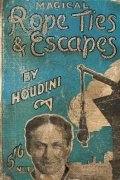 This is one of the best books by Houdini, because here he writes about something he really knows a lot about. With many of his escapes he had to be very familiar with the knots he was tied up. This book has many good illustrations and several photos where Houdini himself demonstrates certain ties. It is a great collector item as well as source of information. If you can only buy one book by Houdini, by this one. 1st edition, 1920, Will Goldston Limited, London; 80 pages.
| ★★★★★ $8 to wish list |
